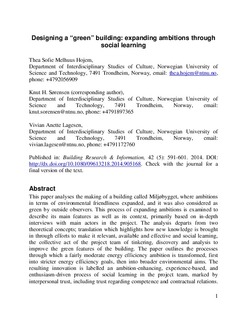Designing a ‘green’ building: expanding ambitions through social learning
Journal article, Peer reviewed
Accepted version

View/
Date
2014Metadata
Show full item recordCollections
Original version
Building Research & Information. 2014, 42 (5), 591-601. 10.1080/09613218.2014.905168Abstract
Full Article Figures & data References Citations Metrics Reprints & Permissions PDF
Abstract
The process of creating a specific building – Miljøbygget in Trondheim, Norway – is analyzed in order to understand how the project team's ambitions expanded to embrace ‘green’ issues and create new targets. The decisions and roles of key actors are investigated regarding these goals and criteria. The analysis draws on two concepts. First, translation theory is used to highlight the potential role of new knowledge or technology that originates outside of the project. Second, the concept of social learning is employed to understand the process of expanding ambitions, developing goals and criteria within the project, and how this is related to the collective exploration, discovery and analysis of new practices. The wider implications are considered with respect to innovation in the construction industry. The project's initial moderate energy efficiency ambition was transformed, first into stricter energy efficiency goals, then into broader environmental aims. The resulting innovation is an ambition-enhancing, experience-based and enthusiasm-driven process of social learning in the project team, marked by interpersonal trust, including trust regarding competence and contractual relations. Translation efforts were also found to be important for bringing new knowledge into the project. The conclusion discusses some policy implications.